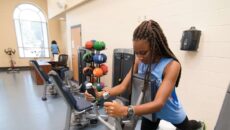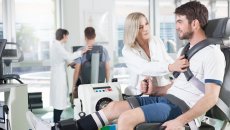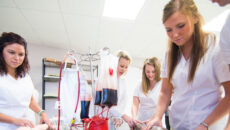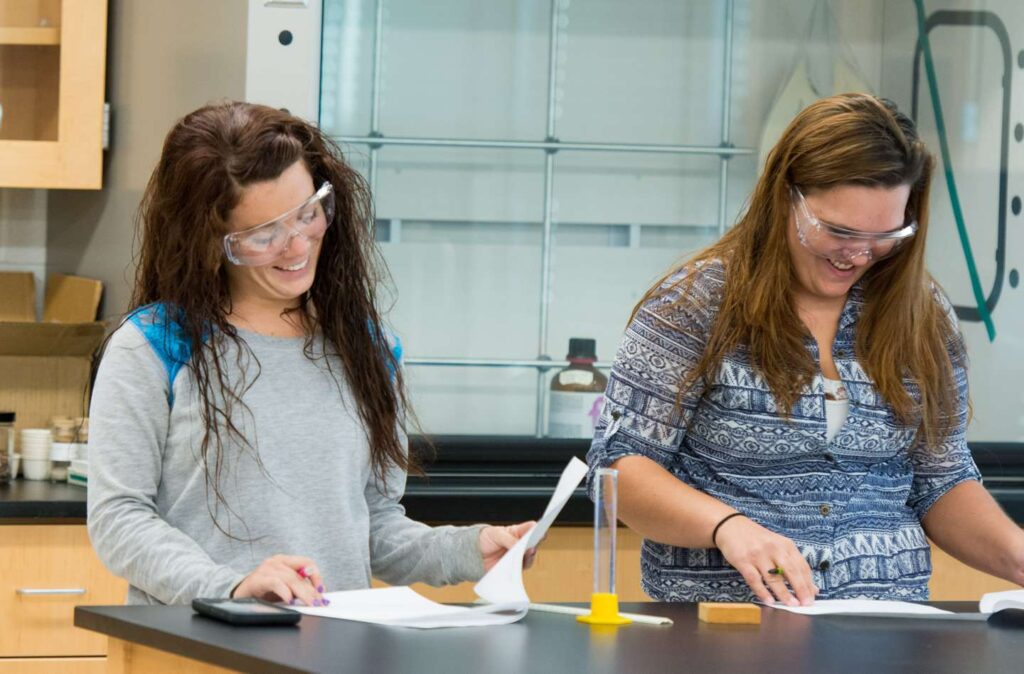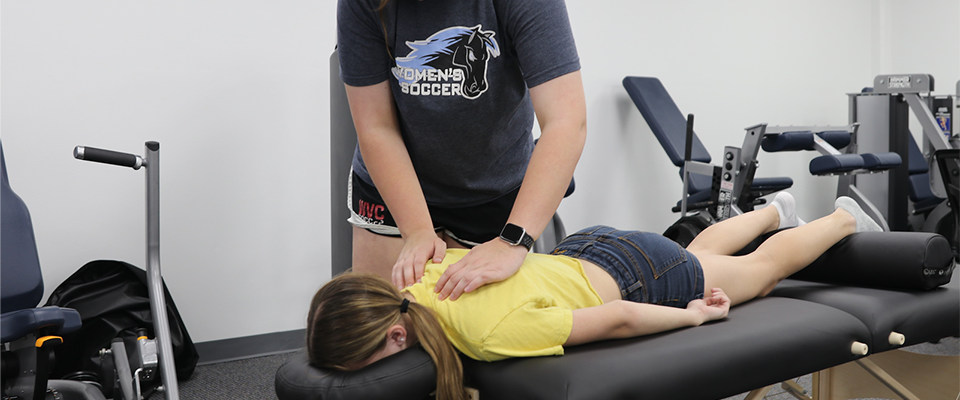
Massage Therapy Degree Program
Prepare for your licensure exam by earning an associate degree in massage therapy from Saint Mary-of-the-Woods College (SMWC). Students will receive hands-on supervised clinical experience, internships and required massage clinic participation with instructors that possess real-world experience.
Associate in Science (A.S.) in Myoskeletal Massage Therapy Overview
Become a crucial part of the healing process for patients of all kinds. Massage therapists practice the application of manual manipulation of soft tissue to reduce the effects of dysfunctional movement patterns, postural compensation, mitigating pain, reducing stress hormones and promoting general health and wellness. Our degree programs provide the flexibility to lead you to the career of your dreams. With your professional advisors helping you along the way, you can mix and match majors and minors to get the perfect degree tailored to you and your career aspirations. Massage therapy is the perfect minor to add to a Kinesiology degree!
The massage therapy program can be completed in as little as two semesters (minor curriculum, 24 credit hours). Upon completing the program, students will be trained and prepared to apply for the state licensure. In order to sit for the Indiana Massage Therapy licensure, students must complete 625 hours of supervised classroom and hands-on experience. This requirement will be met through supervised clinical hours, internship experience and required massage clinic participation.
Massage Therapy Associate Curriculum – College Catalog
Massage Therapy Minor Curriculum – College Catalog
FAQs
What is myoskeletal massage therapy?
Myoskeletal massage therapy is a therapeutic strategy to relieve and ultimately correct patterns in the body that lead to pain and deterioration. It is a comprehensive system of bodywork based on deep tissue massage, joint stretching and nerve mobilization.
Why get a degree in myoskeletal massage therapy?
SMWC is one of only five private colleges in the nation to provide an associate’s degree and a minor curriculum in massage therapy. It is also one of only two institutions in the country that offer massage therapy as a minor, enabling you to add it to your existing health science major. With a student-to-faculty ratio of 13:1, we are confident you will receive one-on-one attention to help and support your learning needs. Not to mention, our degree programs are affordable, with 95% of students receiving financial aid.
What can you do with a degree in massage therapy?
There are several different career paths you can take to work as a licensed massage therapist. This makes it easy for you to tailor your career path to fit your interests. In 2020, there were over 144,000 job postings for massage therapists. Check out the list below to see what fields you could be working in after becoming a licensed massage therapist.
- Private practice
- Sports teams
- Eldercare and geriatric services
- Health clubs and gyms
- Hotels, spas and resorts
- Chiropractic offices
- Hospitals and rehabilitation centers
- Traditional massage centers
What is the average annual salary of someone with a massage therapy degree?
Employment in the massage therapy field is projected to grow 32% over the next ten years, according to the Bureau of Labor Statistics (BLS). Also, the demand for professional massage therapists is highest in Indiana, Ohio, California and Florida. As you look at starting salaries, keep in mind that the cost of living and opportunities to move with a career or industry sector should also factor into your decision. The average salary for a massage therapist is $49,860 according to BLS.
How long does it take to become a licensed massage therapist?
The program can take as little as two semesters to complete! After completing the program, students will then be trained and prepared to apply for state licensure. The time from program completion to licensure can vary depending on licensure preparation and testing timeframes.
Can I start my own private practice as a massage therapist?
Yes! Many massage therapists own a private practice which allows them to set their own schedules and provides more flexibility in treatment options. To put yourself ahead, consider incorporating a business administration major or minor to aid you in opening your own practice. You’ll learn the art and science of massage therapy while also adding essential business skills like finance and human resources to your repertoire.
What support and resources are provided at SMWC?
The Learning Resource Center (LRC) provides exceptional, personalized learning resource services to encourage student success. The LRC offers help with a range of academic support services, including a writing center, tutoring, college success courses and more.
Saint Mary-of-the-Woods College is routinely ranked by US News and World Report among the Best Regional Universities in the Midwest and the Best Value Schools. Our departments are also routinely ranked for their individual degree programs.
See the SMWC Difference:
-
 Best Online Bachelor's ProgramsU.S. News & World Report
Best Online Bachelor's ProgramsU.S. News & World Report -

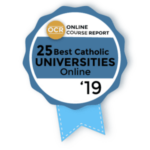 The 25 Best Online Catholic UniversitiesOnline Course Report
The 25 Best Online Catholic UniversitiesOnline Course Report -






 Least Debt - Regional Universities MidwestU.S. News & World Report
Least Debt - Regional Universities MidwestU.S. News & World Report -






 Best Regional Universities in the MidwestU.S. News & World Report
Best Regional Universities in the MidwestU.S. News & World Report -






 Best Value SchoolsU.S. News & World Report
Best Value SchoolsU.S. News & World Report -

 #2 Best Online Colleges in IndianaValue Colleges
#2 Best Online Colleges in IndianaValue Colleges -

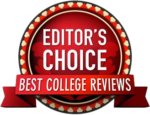 25 Best Online CollegesBest College Reviews
25 Best Online CollegesBest College Reviews -

 Historically Women’s Colleges in the U.S.Great Value Colleges
Historically Women’s Colleges in the U.S.Great Value Colleges -






 Economic Diversity - Regional Universities MidwestU.S. News & World Report
Economic Diversity - Regional Universities MidwestU.S. News & World Report -

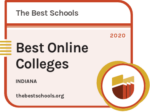 #7 The Best Online Colleges in IndianaThe Best Schools
#7 The Best Online Colleges in IndianaThe Best Schools -

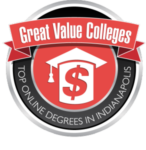 #5 Online Colleges in IndianaGreat Value Colleges
#5 Online Colleges in IndianaGreat Value Colleges -
Best Online Colleges & Schools in IndianaStudy.com
-

 #7 Best Online Colleges in IndianaAccredited Schools Online
#7 Best Online Colleges in IndianaAccredited Schools Online -


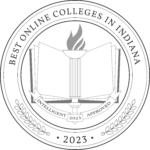 #6 Best Online Universities and Colleges In IndianaIntelligent
#6 Best Online Universities and Colleges In IndianaIntelligent -


 #5 Best Affordable Schools in Indiana for Bachelor’s DegreeAffordable Schools
#5 Best Affordable Schools in Indiana for Bachelor’s DegreeAffordable Schools -
Top College for AffordabilityScholarship360
-


 #2 Best Affordable Catholic Colleges with Online Bachelor’s DegreesAffordable Schools
#2 Best Affordable Catholic Colleges with Online Bachelor’s DegreesAffordable Schools -






 Top Performers on Social MobilityU.S. News & World Report
Top Performers on Social MobilityU.S. News & World Report -

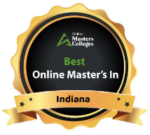 Best Online MastersOnline Masters Colleges
Best Online MastersOnline Masters Colleges -
#8 Top Online Colleges in IndianaOnlineDegrees.com
-

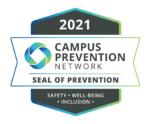 CPN Seal of PreventionCampus Prevention Network
CPN Seal of PreventionCampus Prevention Network -
Top Adult Degree ProgramsAbound
-

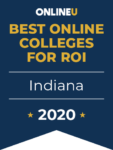 #8 Best Online Colleges in IndianaOnlineU
#8 Best Online Colleges in IndianaOnlineU -

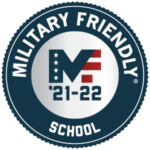 Designated Military Friendly SchoolMilitary Friendly
Designated Military Friendly SchoolMilitary Friendly -

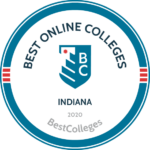 #6 Best Online Colleges in IndianaBest Colleges
#6 Best Online Colleges in IndianaBest Colleges -

 #3 Accredited Online Colleges in Indiana for International StudentsScholarship Hall
#3 Accredited Online Colleges in Indiana for International StudentsScholarship Hall -
#9 Schools Ranked by Student-Faculty RatioOEDb
-

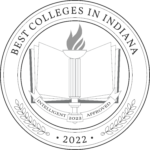 #6 Best Colleges in IndianaIntelligent
#6 Best Colleges in IndianaIntelligent -


 Easiest AdmissionsIntelligent
Easiest AdmissionsIntelligent -

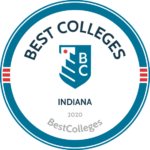 Best Colleges in IndianaBest Colleges
Best Colleges in IndianaBest Colleges -

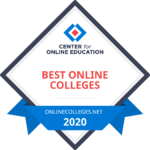 #10 Best Online CollegesCenter for Online Education
#10 Best Online CollegesCenter for Online Education
